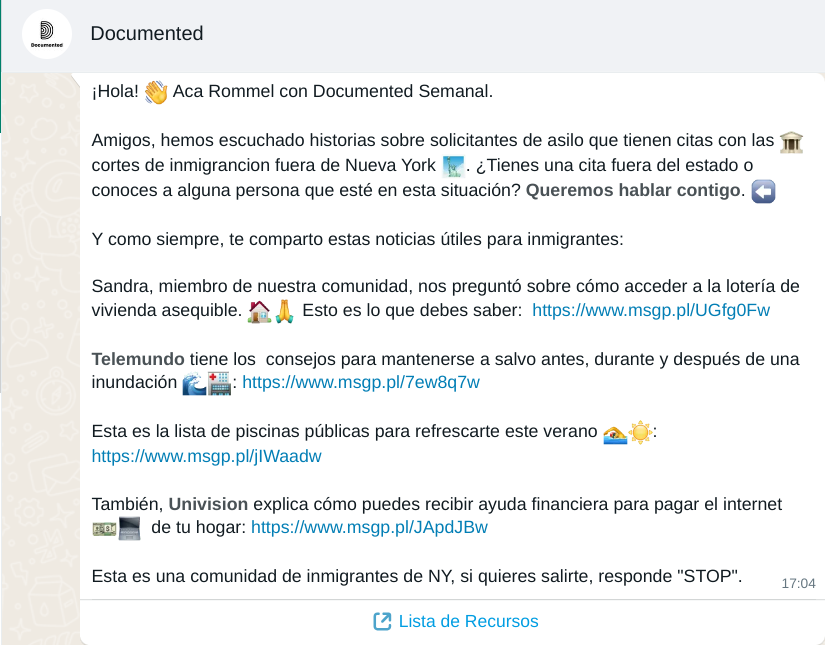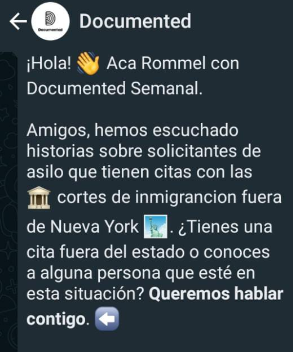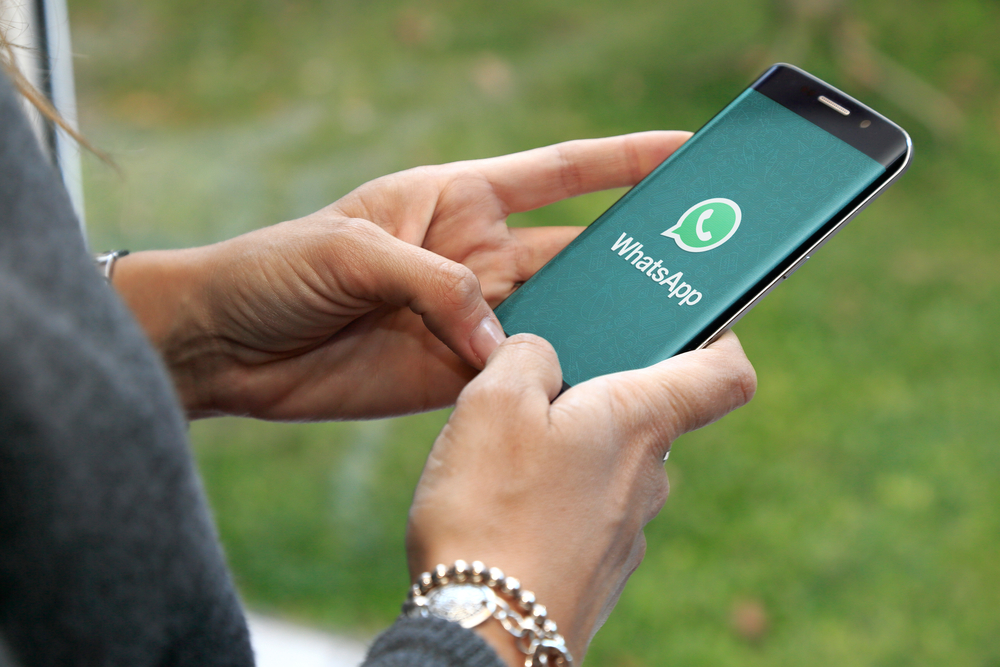Since the launch of award-winning Documented Semanal in 2019, our newsroom has developed a unique approach to engage with our audiences via WhatsApp.
It is beyond just a distribution channel. It’s a conversation between a user and a journalist and it has become the engine of our reporting on Latino audiences in New York. It looks like this:

Here I’m going to explain what we do (and what we don’t do) the products that come out of it, the tech we use, and who else is doing great work.
Also Read: Asylum Seekers Use WhatsApp to Navigate NYC With Documented Journalists
A note
We started with just our friends in the WhatsApp list and 4 years later, we now surpassed the mark of 6,000 members who receive our Semanal newsletter each week.
With the launch of WhatApp Channels, this number will likely be surpassed by media outlets with larger reach. Although we recognize that an even larger number of people receiving our content would be amazing, our model for WhatsApp is not one that is aimed at distributing stories only. We use it to also engage with the readers who receive the content on a personal level, and we leverage these connections to then understand trends and make more content based on our interactions.
Also Read: How We Came to Launch a WhatsApp Product
What we do
1. We talk with our audience: Sounds easy, but it’s not. We dedicate more than 60% of a journalist’s day to respond to people and engage in conversations with them. Person by person. One by one.
2. We get personal: After all, WhatsApp is a platform where we all talk with our parents and friends and thus, we expect an answer. We make sure that every single user receives the name of the Documented professional they are talking to and, in some cases we get very personal, like sharing our birthdays for digital celebrations.
3. We generate trust: We decided to use 1–1 conversations instead of groups. This is because our initial research showed us that privacy was among the needs of this audience.
By dedicating so many hours a day talking to our audience, we are able to forge a personal relationship with many of those that talk to us, to a point that we receive very sensitive information.
3. We make investigations from our conversations: Our conversations are analyzed on a daily basis to understand trends. These trends help us kickstart investigations that we publish and then, send back to our users who are often sources in our published articles.
The following are some of the investigations we have made from the conversations with our WhatsApp Latino audience:
- Latin American Migrants Use TikTok to Share Their Journeys to the U.S. Border
- Excluded Workers Fund Hit With Debit Card Thefts
- Scam Messages Are Targeting Immigrants On WhatsApp and Social Media
- Latin American Immigrants Can’t Reach Their Consulate
4. We make explanatory guides from our conversations:
In our daily conversations, many people ask us the same questions. It make sense, as the need of one person living through the bureaucracy of the U.S. immigrant system can be the same as many others.
Instead of responding to many people with the same answer, we decided to make explainers that get sent back to all those who asked for that information. These explainers also become part of our List of Resources, a product that is now 60% of our monthly traffic.
We put all of our journalism practices into making these explainers: we interview people, verify content, edit, copy edit and SEO all the articles and we make sure that people understand that we don’t provide any other service than informational. We, for example, cannot actually help our readers with their asylum cases but we can refer them to our list of affordable legal professionals.
5. We cross our conversations with our analytics: this is what we call a “match”. It happens when the conversation on WhatsApp coincides with the analytics we get from traffic or search.
When a “match” happens, we assign a reporter to investigate the subject with the goal of writing an explainer, an investigation or both.
6. We ask when we think that something is going on. And sometimes we are proven wrong: Because of our journalism background, we may think that something is of interest of our audience. When that happens, before assigning a reporter and spending time reporting on a subject, we make a call out to our list. It can happen in our newsletter Semanal or as a standalone message.

With that engagement call out, we get responses to verify if what we think is newsworthy actually is to our audience.
Sometimes, however, we are proven wrong.
TestPost3
Also Read: How We Changed Our Pandemic Coverage Thanks To Our Audience.
What we don’t do
- We don’t use WhatsApp as a distribution channel: It is very easy to just have WhatsApp as another way of pushing your content into people’s phones. In fact, some media outlets that have opted to form groups or those that opened Channels will only ever use it for this purpose. We don’t do it, since it would strip us from our engagement benefits we get from chatting with our users.
- We don’t extract from users: If we made journalism from WhatsApp, we publish it on WhatApp. Always. Otherwise, our process would become extractive and our users wouldn’t gain from our investigations that are, at the same time, made from their insights and conversations.
- We don’t share our data: Aside from the number of users that receive our messages, we do not, nor will we ever, share the list of phones or any other personal detail with anyone outside Documented. In fact, only a very few people within the organization have access to this data.
- We don’t send messages to people who didn’t sign up: If we did, it would be called spam. We don’t do spam, we do engagement journalism. But it would also be a terrible idea because the WhatsApp algorithm will flag you as such and you could end up banned.
Also read: How a Community-Oriented Approach Grew Our Immigrant Audience
Who else is doing great work
Please check out the work these amazing organizations are doing amazing journalism on WhatsApp:
- Conecta Arizona (USA)
- Consonante (Colombia)
- Cápsula Migrante(Perú, Venezuela)
- 263chat (Zimbabwe)
- The Continent (South Africa)







